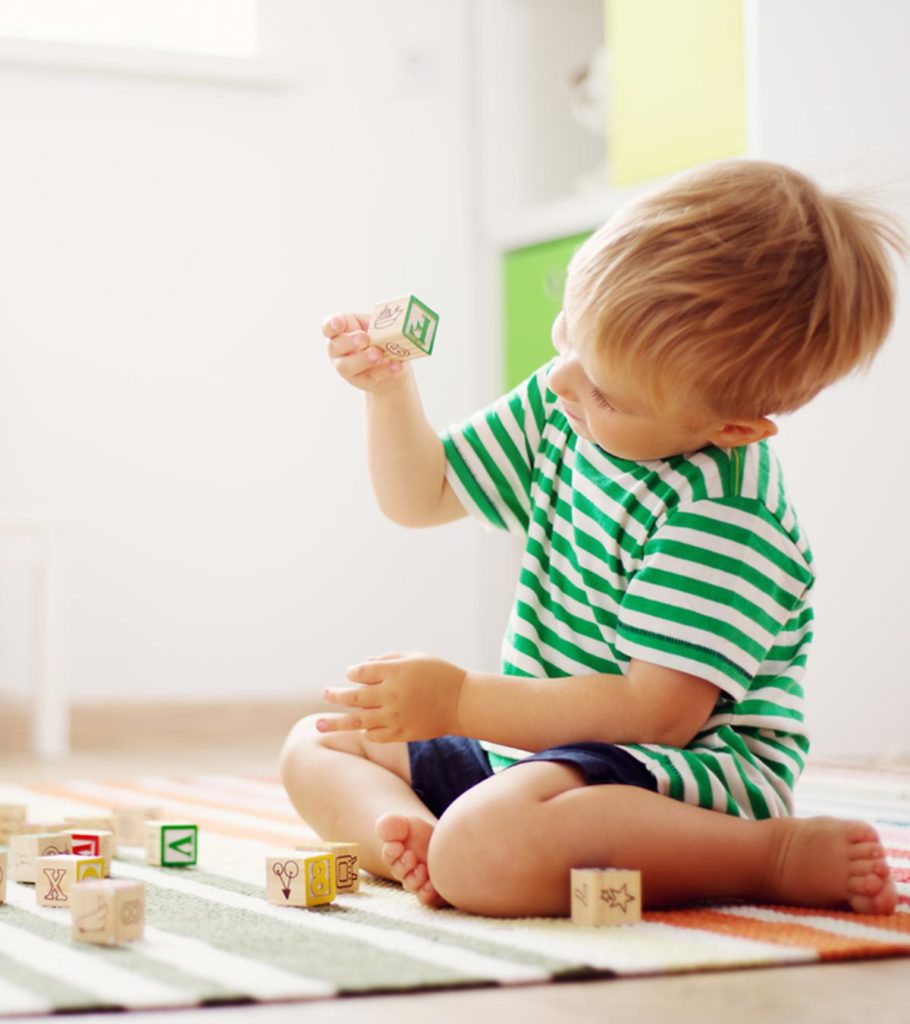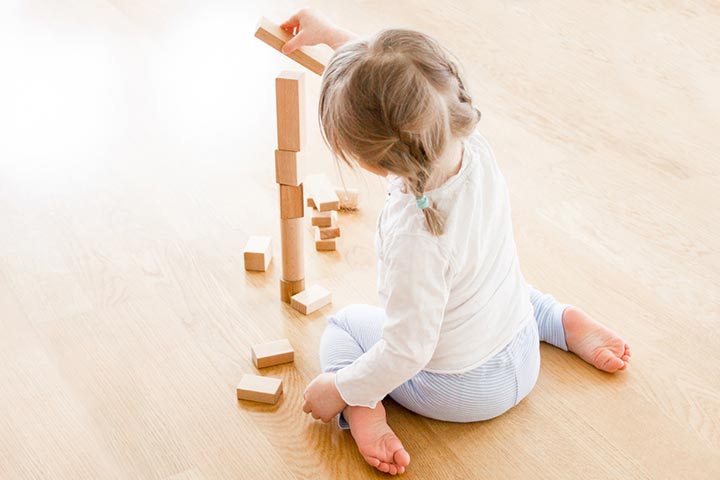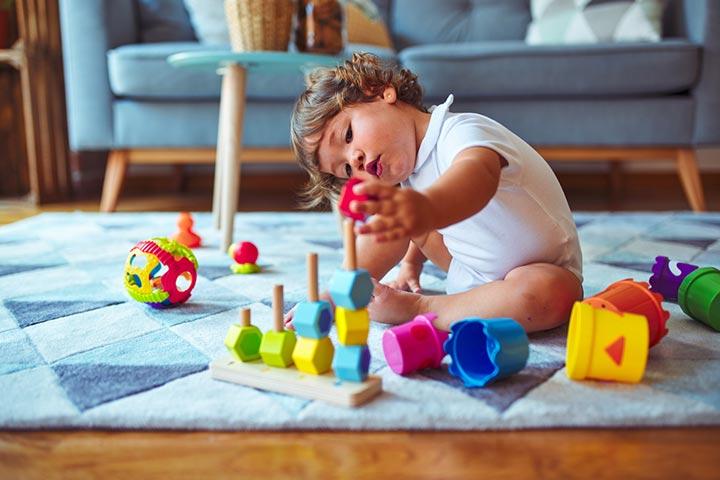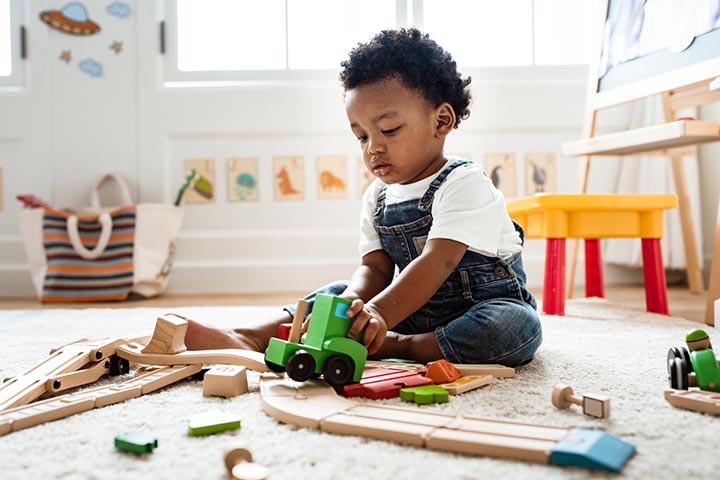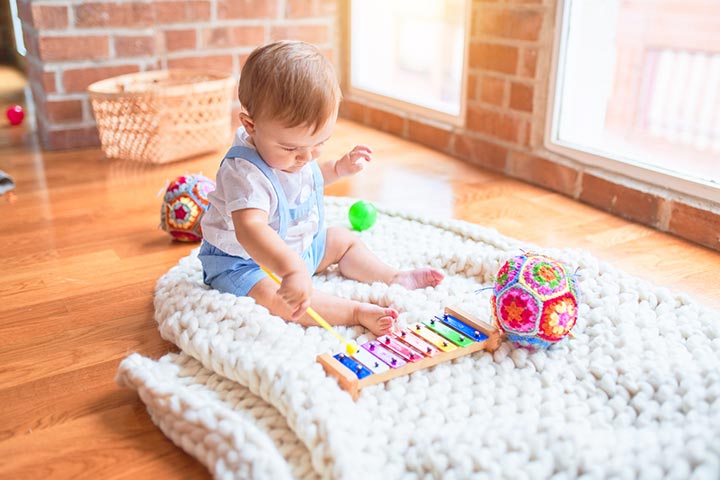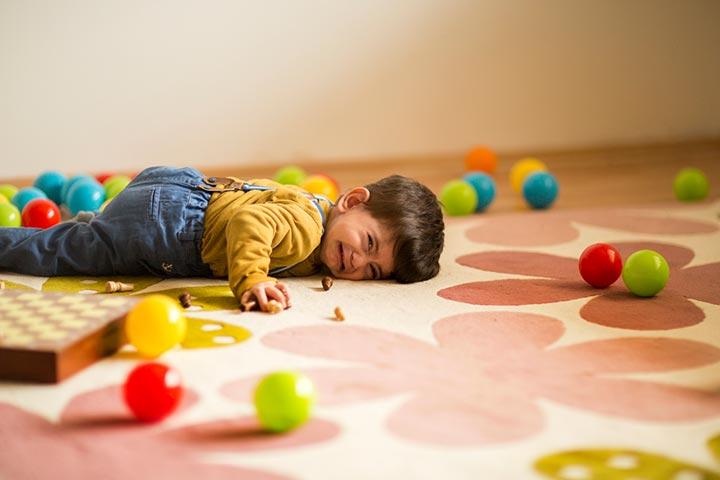Solitary play or independent play is when the child plays by themselves for short periods. Learning to entertain themselves and playing alone is a significant milestone for infants. However, it may overwhelm the parents to see their child playing alone. Dr. Mildred Parten Newhall, a sociologist, studied the behavioral development in the age group two to five and identified six different stages of children’s participation in play. Unoccupied play, solitary play, onlooker play, parallel play, associative play, and cooperative play are the six stages of play, as mentioned by Dr. Newhall. Children learn about their bodies, environment, and the people around them as they evolve through these stages. Read this post to know more about the solitary play stage, how it is important for children and how you can encourage your child to transition to the next stage.
What Is Solitary Play?
Solitary play, also known as independent play, is the stage when a child starts playing alone. As per the solitary play definition, it is one of the earliest stages of play, and the child is yet to develop the ability or the social skills to play with others. At this stage, the child looks for some alone time and prefers to entertain themselves by playing alone and not in a group (1).
In solitary play, babies explore the different aspects of their surroundings. Through self-direction, they try to manipulate different objects they come in contact with, including different parts of their bodies, and become familiar with different movements, textures, and objects. This exploration benefits them in many ways, which are discussed in detail below, and prepares them to transition to the next stage of play, called onlooker play.
When Does Solitary Play Begin?
Solitary play starts at a very young age. Sometimes, children start playing independently from the ages of two to three months, once they start seeing different colors and textures.
According to Sara, a mother to three, solitary play can be introduced when your child is just a newborn. She says, “We allowed Carrie, our newborn, to sometimes cry a little bit and not immediately come to her aid. We would let her lay on the floor and just look around, or we’d give her something to look at. So we weren’t constantly holding her and constantly being the one to entertain her. Doing that at such a young age helped her self-soothe and entertain herself, and also realize that we weren’t always going to be there to provide for her every source of entertainment (i).”
As they grow older, they start taking a more active interest in toys and other objects around them and even play in isolation. When they are around four to six months, they become more self-supporting and start interacting with the toys. They notice objects and toys within their reach and try to touch them or interact with them in some way (1).
However, no two children are the same, and there is no set timeline for your child to learn self-reliance. Some children might take some time to reach this stage of self-dependence, while others might reach it before the stipulated age.
Importance Of Solitary Play In Child Development
Each stage of play develops essential skills for a child. Independent play is crucial for developing a child’s imagination and creativity. Moreover, solitary play also improves a child’s concentration and the ability to explore how things work. All these make a child a bit more independent.
The following are a few benefits of solitary play (2) (3) (4):
1. Promotes independence
Even at a very young age, children realize that they can entertain themselves quite effectively through solitary play. They understand that solitary play is self-sustaining and self-sufficing. Toys and objects that make a child play independently can teach them how to be happy in their own company. They slowly realize that they need not be dependent on others for everything.
2. Makes them realize preferences and interests
Children learn what makes them happier. Some children prefer playing with cars, while others prefer dolls or kitchen sets. These preferences and interests could further include dancing, listening to music, playing with building blocks, playing with clay, and coloring. Self-contained play helps every child discover what they like.
3. Encourages creativity and imagination
As long as a child doesn’t start playing independently, you may not realize how imaginative they are (5). When they play in seclusion, they are unburdened by expectations, and they can interpret things in their own way and play with their toys.
4. Improves concentration
Children develop the power of concentration by deciding what and how they want to play. When they play in reclusion, they have complete control over the play, and they decide their actions. This allows them to focus and concentrate on a single object for an extended time.
5. Helps them have fun on their own
When a child starts playing independently, they are setting the base to entertain themselves without anyone’s aid. They do not experience aloneness. In fact, solitary play is one of the best ways to let a child take care of their own entertainment in their own imaginative ways. It also promotes self-governance.
6. Prepares them for school
Going to school is one of the most significant events in a child’s life. As they step out from a place they know and feel safe into a totally new environment, solitary play makes this transition easier, both for the child and the parents. Children who are encouraged to play independently can adjust to new surroundings easily without experiencing loneliness due to separation from family. They are able to entertain themselves and find fun things to do in a new place.
7. Improves their problem-solving abilities
Even a simple thing such as fetching a toy requires quite a lot of brainwork from your child. Solitary play encourages thinking and problem-solving in your child, and they become adept at navigating various obstacles. It also helps them develop self-determination. It may help instill the quality of persistence and trying different ways of arriving at a solution.
8. Gives you a break
Taking care of children is a taxing job. Parents are around their babies to do everything they need. Solitary play activities let the parents get a breather while their child learns self-sufficiency and entertains themselves.
9. Develops their motor skills
As children explore the things in their environment and manipulate and play with toys and other objects, they develop their senses and motor skills.
10. Teaches self-regulation
During solitary play, a child decides what toy to use, how to move and regulate them, and when to stop. They are responsible for creating the rules. This gives them a sense of control and confidence to work alone. These skills can help them in social interactions later.
11. Teaches self-discovery
Playing alone gives children an opportunity to focus on their likes and dislikes. They understand preferences, such as favorite toy or favorite color. This helps them build a sense of individuality and can also influence how they choose and interact with others in the future.
Examples Of Solitary Play
Depending on the age of a child, solitary play activities can be different. However, some common examples of solitary play include:
- Looking at pictures or bright colors
- Shaking a rattle to produce noise
- Playing with a baby gym
- Stacking blocks or cups
- Holding and looking at a toy
- Making a drum out of utensils
- Flipping through the pages of a book as if they are reading
- Setting up a kitchen and doing various activities
- Conducting a tea party with dolls
- Working on a puzzle
- Coloring or drawing
- Playing with a train set
- Playing with playdough
Solitary Play Activities
Besides the examples mentioned above, the following are some common activities associated with solitary play. These are easy activities that could keep a child busy for some time.
- Giving your child sidewalk chalk to draw
- Giving them child-safe magnets to play with
- Building them a tent filled with their favorite toys in it
- Putting on their favorite music
- Asking them to match the images in a book with objects in real life
- Giving them sensory toys, such as socks filled with rice or playdough
- Giving them age-appropriate toys that they can gather and stack or build — kitchen sets, wooden blocks, train sets, LEGO blocks, or Magna-tiles are good examples
Encouraging Solitary Play In Children
While solitary play is quite common in children, they might expect you or their siblings to be around them while they play. However, you can encourage independent play in the following ways:
- Provide them the right toys
Battery-operated toys can be gratifying as they usually come with lights and sounds. But they do not help your child much developmentally. Give them open-ended toys, such as blocks, playdough, and kitchen utensils, so that they can explore how each thing works.
- Allow them to play alone
You might want to play with your child all the time, but solitary play is essential for the child’s development. Therefore, it is imperative that you let your child play alone so that they use their imagination and creativity.
- Understand your child
Every child is different. One child might prefer self-containedness and opt for solitary play. They might need encouragement to play with other children, while the other might be the complete opposite. As a parent, you must understand what your child needs and try to make them experience a part of everything.
- Give your child an open play space
For your child’s imagination to soar, give them a free and safe open space. It might be a sidewalk, a park, or even a balcony in your apartment. Keep an eye on them for your satisfaction, but let them play as they wish.
- Do not interfere
Even if you see your child struggling to make a decision while playing independently, do not interfere and give suggestions if they have not asked you. Sit back, relax, and watch them as they solve problems independently and come up with ingenious solutions. If you interfere, it might interrupt their thinking process and make them depend on you for making decisions.
Common Concerns About Solitary Play
Solitary play or independent play is most common among children between the ages of one and two. This is the stage when they are more self-centered and do not possess the required social and communication skills. While the ages given are not on a universal scale, if you feel your child does not show any inclination to play independently, you might want to consult a pediatrician and clear all your doubts.
You will know what type of play your child prefers once you have gone through the post. Solitary play helps the child learn about their likes and dislikes and encourages them to have a mind of their own in deciding the way they would want to do things. It makes them much more independent and teaches them to enjoy their own company. This also helps boost their confidence and self-esteem. Therefore, by following up on some of their traits during playtime, you will know the type of company your little one feels most comfortable in.
Key Pointers
- Solitary play helps children explore their surroundings, the objects around them, and also their body parts.
- It makes children independent, helps them understand their interests, and improves concentration.
- Encourage solitary play in children by letting them look at bright pictures, allowing them to draw and color, or giving them a puzzle.
